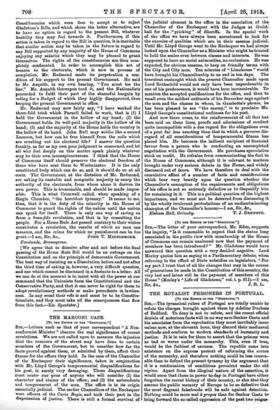THE MARCONI CASE.
[To nix EDITOR OF TER "SPECTATOR."]
SIE,—Letters such as that of your correspondent "A Non- conformist Minister" obscure the real significance of recent revelations. We are not called upon to measure the injustice that the rumours of the street may have done to certain members of the Government, but to consider how far the facts proved against them, or admitted by them, affect their fitness for the offices they hold. In the case of the Chancellor of the Exchequer their significance, taken in conjunction with Mr. Lloyd George's temperamental disqualifications for his post, is surely very damaging. Those disqualifications must sauter aux pear of anyone who will consider (1) the character and claims of the office ; and (2) the antecedents and temperament of the man. The office is in its origin essentially judicial. The earlier Chancellors of the Exchequer were officers of the Curia Regis, and took their part in the dispensation of justice. There is still a formal survival of the judicial element in the office in the association of the Chancellor of the Exchequer with the Judges at Guild- hall for the " pricking " of Sheriffs. In the special work of the office we have always been accustomed to look for the exercise of qualities which are in their essence judicial. Until Mr. Lloyd George went to the Exchequer we had always looked upon the Chancellor as a Minister who might be trusted to hold the scales even between classes and interests. He was supposed to have no social animosities, no exclusions. He was expected, for obvious reasons, to keep on friendly terms with the City and City men. Ten minutes of " Limehouse " would have brought his Chancellorship to an end in ten days. The truculent onslaught which the present Chancellor made upon Lord Rothschild would not only have been unpardonable in one of his predecessors, it would have been inconceivable. To mention the accepted qualifications for the office, and then to recall even the mildest outbursts of his Berserker rage against the men and the classes in whom, in Gambetta's phrase, he has been pleased to see "the enemy," is to proclaim Mr. Lloyd George's constitutional unfitness for his post.
And now there come, to the reinforcement of all that has been said on these lines, proofs and admissions of conduct quite incompatible with a due regard for the obligations even of a post far less exacting than that in which a perverse dis- regard of all considerations of temperamental fitness has placed him. He becomes the indirect recipient of financial favour from a person who is conducting an uncompleted negotiation with the Government. He purchases speculative stock on credit. He refrains from communicating the fact to the House of Commons, although it is relevant to matters brought under very serious debate in the House, and widely discussed out of doors. We have therefore to deal with the cumulative effect of a number of facts and considerations which bear very heavily upon the question whether the Chancellor's conception of the requirements and obligations of his office is not so seriously defective as to disqualify him for remaining in it. This is a political question of the highest importance, and we must not be deterred from discussing it by the wholly irrelevant protestations of an undiscriminating champion of the Chancellor's honour.—I am, Sir, &c.,


























































 Previous page
Previous page